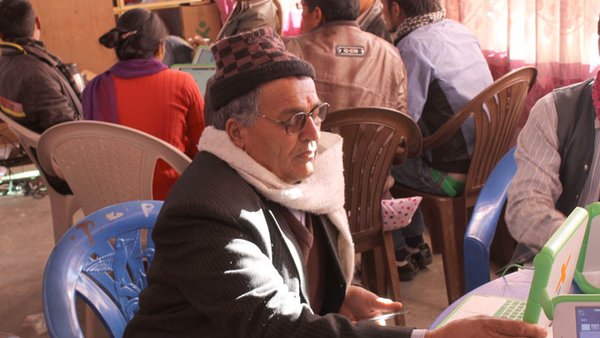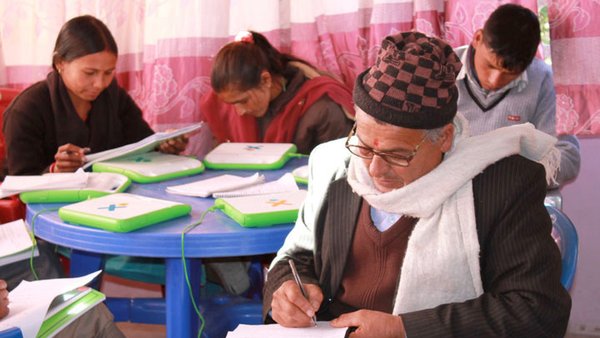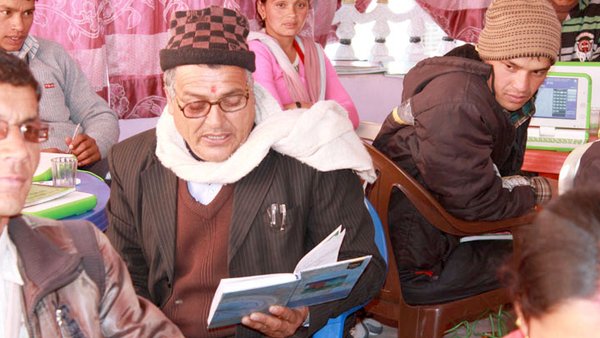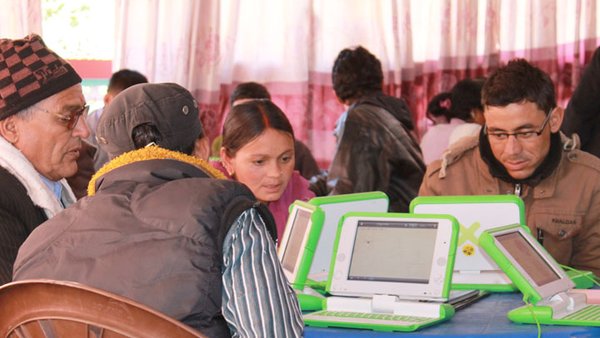The narrow training hall in the KP Plaza Hotel, crammed with 24 teachers, one school supervisor and four OLE Nepal staff, resembled the crowded fish market in the heart of Kathmandu. Actually, it was not exactly a hall, but a balcony turned into a hall by hanging curtains along the three open sides. The cold breeze from the Seti river streamed continuously through the gaps between the curtains, but that did not bother the participants gathered there for the seven-day long training on using laptops and digital learning tools in classrooms. Neither did they complain about the foul smell and the continuous noise from the generator. At 10 AM on January 22, 2014 Bajhang district headquarter, Chainpur, was slowly coming to life, and the participants braved the cold and and the inconvenience to get started with enthusiasm.
Curious faces filled the hall. Among them was a man who looked wiser than the rest. As the trainer were about to welcome the participants, Gauri Lal Joshi, a seemingly wise 58 year old teacher from Bhumiraj Primary School stood up and said, “I have attended countless trainings that claimed to make me a better teacher, but I honestly cannot tell if those trainings really helped me be one.” He continued in a rather whimsical fashion, “If this training program has no practical use, then you are wasting our time.” Mr. Joshi’s body language suggested that he had already disapproved of the training that was meant to enable teachers to integrate technology in teaching. That led to some uneasiness amongst other participants, but it did not seem to bother him what others thought of his rather crude remark. He sat down unconvinced when the trainer asked him hold his judgement till the latter part of the training in the coming days.

During lunch, Mr. Joshi told us that he had been a teacher for the last 34 years. He seemed to be an accomplished teacher, but had a lot of misgivings about the many trainings and the trainers organized by the District Education Office. He claimed that they were useless, tedious and unrealistic. On the first day of the training which included familiarizing participants with computers and the digital learning materials, Mr. Joshi took part in the activities with a lot of interest and motivation. When the laptops were distributed amongst the participants, it would be fair to say that Mr. Joshi was not any less excited than his younger colleague, Dambar Bhatta. By the end of day one he had started to show a friendlier disposition in contrast to his attitude in the morning.

The homework for the second day of the training was to prepare a lesson plan for a grade and subject that the participant taught. Mr. Joshi and four of his colleagues were the first to arrive at the training hall, and all of them had completed their work. Contrary to my experience with trainees in other districts, all five of them had written SMART objectives. Mr. Joshi was quick to attribute the acquired skills of writing SMART objectives to the training they received recently on Child Friendly Classroom Teaching which contradicted what he said about trainings he had attended in the past.
Interactive digital learning materials, E-Paath was in the focus for the second day of the training. The plan was to help teachers to see the interrelationship between the curriculum, textbooks and E-Paath. They learnt how to prepare a lesson plan integrating E-Paath for in the concept they were preparing to teach. Mr. Joshi seemed mesmerized by the Nepali E-Paath activities, especially the recitation of the poems. He would play one particular poem about the watch (घडी ) over and over to the point that he started disrupting the training session. But when asked to close it, he would acquiesce, and often pass witty comments drawing loud laughter from other participants. By the end of day two, Mr. Joshi had a newer lesson plan written in which he had the following objective: able to recite the poem “Watch” (घडी कविता वाचन गर्न।)

On the third day, Mr. Joshi looked more confident. He agreed to chair the entertainment committee for the day and entertained the participants with his dances and songs. Third day was dedicated for helping teachers understand about the digital library, the E-Pustakalaya – how to connect to it, and how to navigate through various sections and to search for specific items. Mr. Joshi had no problem finding the router and connecting to it, and accessing the E-Pustakalaya home page. The E-Pustakalaya resources seemed to captivate him. As the participants were being taught to navigate through the sections of the library and then to children literature section of the library, Mr. Joshi was overheard saying, “BP’s Sumnima is also here. I wanted to read it for a long time.”
Third and fourth days too went by with Mr. Joshi being punctual, submitting all his assignments in time and participating actively in discussions. He had many pertinent questions which ranged from class management to computer-enabled teaching strategies. He never missed any opportunity to either recite a poem, or to tell a joke or two or even to perform dances for other participants, most of whom were less than half his age. He never failed to brightened the hall with his lovely gestures and brilliance in poetry recitation. He definitely had a keen interest in Nepali poems. He seemed overjoyed finding Siddhicharan, Devkota, Poudel, Ghimire and other popular writers in the E-Pustakalaya’s literary collection.

On the sixth day, there were few visitors in the training hall. They included Chief District Education Officer, Local Development Officer and Chief District Officer (CDO). The CDO asked someone from the participants to give his/her views about the training. Everyone expected Mr. Joshi to stand up, and he did not disappoint them. “I liked the training because I am immersed in it” he said. And he continued, “I can see that children will be happy to have the computers in front of them.” To the CDO’s question if he would implement the acquired skills for the benefit of children, he promptly replied, “Yes.”
Mr. Joshi repeatedly said that he could not believe the seven day long taining passed quickly without his noticing it. Before everyone departed for their homes, Mr. Joshi wanted to say a few things to his colleagues and to the OLE Nepal team. He stated that he learned not just the computer basics, but also the skills to conduct computer-enabled classes. He said that he particularly liked the E-Paath and E-Pustakalaya as the resources would be useful for students. And he pointed out that knowing digital materials was the easy part, but teaching children using the same will be much more challenging. He wished everyone success in ICT enabled teaching. He further said, “I am going to retire in a few months, so I do not have much teaching time left for me.” He paused for a moment and ended his statement saying, “Contrary to what I had in mind on the first day of the training, I liked the training. But my love were E-Paath and E-Pustakalaya.” He further continued, “I, however, think that the technology arrived late for me and for many of my students.”